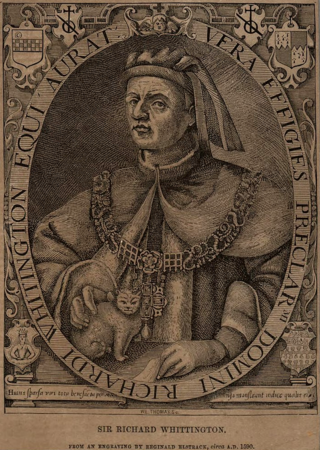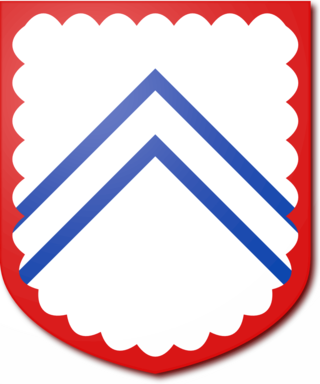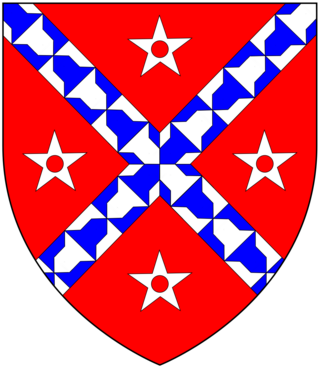Related Research Articles

Richard Whittington of the parish of St Michael Paternoster Royal, City of London, was an English merchant and a politician of the late medieval period. He is also the real-life inspiration for the English folk tale Dick Whittington and His Cat. He was four times Lord Mayor of London, a member of parliament and a Sheriff of London. In his lifetime he financed a number of public projects, such as drainage systems in poor areas of medieval London, and a hospital ward for unmarried mothers. He bequeathed his fortune to form the Charity of Sir Richard Whittington which, nearly 600 years later, continues to assist people in need.

Ralph Neville, 1st Earl of WestmorlandEarl Marshal, was an English nobleman of the House of Neville.

Sir John Tyrrell, of Heron in the Essex parish of East Horndon, was an English landowner, lawyer, administrator, and politician who was chosen three times as Speaker of the House of Commons.
Sir John Guildford, JP, of Hemsted in Benenden, also written Guilford, was an English landowner, administrator and politician.
The constituency of Gloucestershire was a UK Parliamentary constituency. After it was abolished under the 1832 Electoral Reform Act, two new constituencies, West Gloucestershire and East Gloucestershire, were created.
Richard Clifford was a Bishop of London who had previously been Bishop of Worcester, Bishop-elect of Bath and Wells, and Lord Privy Seal.
Sir Henry Anderson (1582–1659) was an English Royalist landowner and politician who represented Newcastle-upon-Tyne once as Mayor and twice as MP in the House of Commons between 1614 and 1643 and was also High Sheriff of Northumberland.
Sir Thomas de Rokeby was a 15th-century English soldier, Knight of the Shire and High Sheriff of Yorkshire.

The Guldeford Baronetcy, of Hempsted Place in the County of Kent, was a title in the Baronetage of England. It was created on 4 February 1686 for Robert Guldeford. The title became extinct on his death in circa 1740. The Guldeford family descended from Sir John Guldeford, Comptroller of the Household during the reign of King Edward IV. After supporting the Earl of Richmond, Sir John and his son, Sir Richard Guildford, were attainted by Parliament. However, they were restored to favour after the accession of Henry in 1485. Sir Richard gained prominence under Henry and notably served as Master of the Ordnance. By his first wife Sir Richard was the father of Sir Edward Guildford, Lord Warden of the Cinque Ports and Master of the Ordnance, whose daughter Jane Guildford married John Dudley, 1st Duke of Northumberland. Sir Richard Guildford's second son by his first wife, George Guildford, of Hempstead Place, Kent, was the father of Sir John Guldford, High Sheriff of Kent during the reign of Edward VI. Sir John's son Sir Thomas Guldford entertained Elizabeth I in 1575. Sir Thomas was the great-great-grandfather of Sir Robert Guldford, 1st Baronet.
Thomas Cobham, 3rd Baron Cobham was an English nobleman and politician.
Sir Francis Brandling was an English landowner and politician who sat in the House of Commons from 1624 to 1625.
Sir William Selby was an English politician who sat in the House of Commons from 1597 to 1601.
Sir Robert Swinburne, of Swinburn and Gunnerton, Northumberland and Little Horkesley, Essex, was an English politician.
William Cheyne, of Shurland in Eastchurch, Isle of Sheppey, Kent, was an English politician.
Sir Richard Lowther of Lowther Hall, Westmorland was an English soldier and official. He was twice High Sheriff of Cumberland and Lord Warden of the West March in 1592.

Robert Hill (c.1361–1423) of Spaxton, Somerset was four times MP for Somerset, in 1414 and 1415 jointly with Sir Hugh Luttrell (c.1364–1428) of Dunster Castle, and then in 1416 and 1419.
Sir John Russell, of Strensham in Worcestershire where he held the manor and advowson, was an English landowner, soldier, administrator, courtier and politician.
Adam Bamme was an English goldsmith and politician who served two non-consecutive terms as Lord Mayor of London in the 14th century.

Sir Robert Ogle (c.1370–1436) of Ogle, Northumberland was an English landowner, Member of Parliament and administrator.
Sir Thomas Umfraville (c1362-1391) was an English landowner, soldier, administrator, diplomat, and politician who sat in the Parliament of England as member for Northumberland in 1388 and 1390 and also served as High Sheriff of Northumberland in 1388.